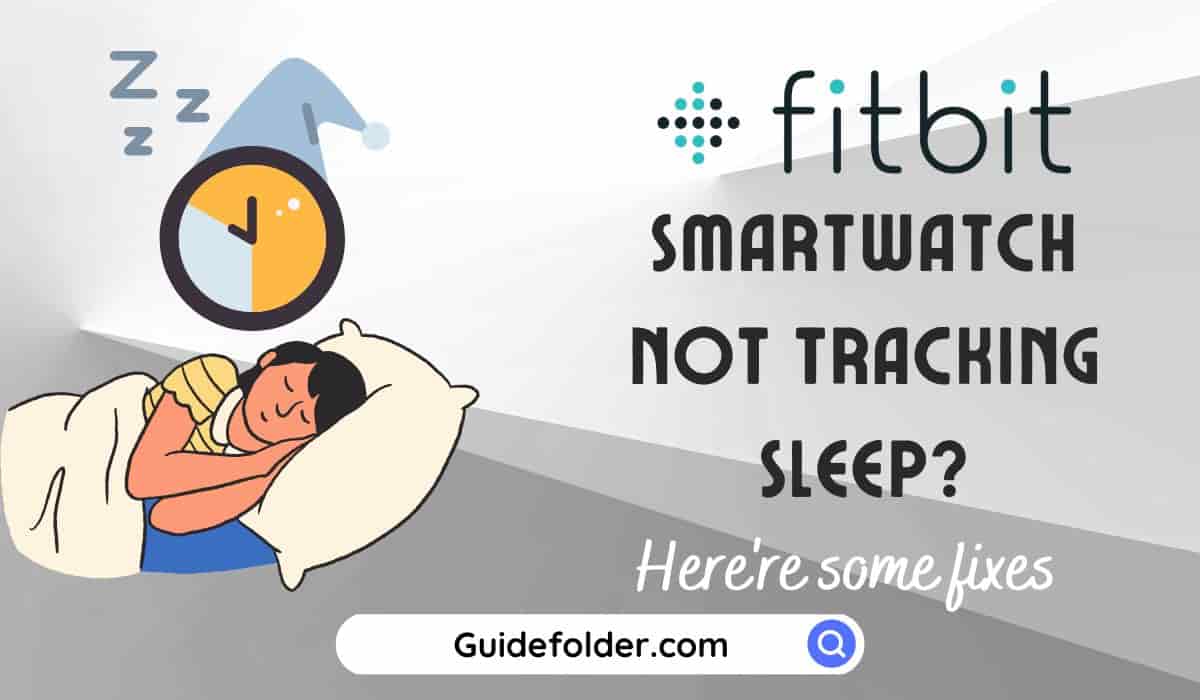A wonderful wristwatch with many features, such as sleep tracking, is a Fitbit device. Some Fitbit users, however, say that they are unable to track their sleep. So, if you’re one of those wondering why your Fitbit Smartwatch Not Tracking Sleep, read on.
Try rebooting the Fitbit first if it’s not monitoring your sleep. Next, examine the app’s settings to determine if sleep tracking is enabled or if, depending on the permissions, sleep data can be sent or fetched from the support app (Android | Apple). If the issue still exists, try adjusting the level of the sleep sensation.
Therefore, if your Fitbit isn’t functioning properly and you want to track your sleep, you may address the issue and get it back to full functionality. This way, you won’t miss any metrics regarding your sleep.

How FitBit tracks sleep?
Through a mix of heart rate and activity patterns, Fitbit calculates various sleep stages. When the tracker senses you haven’t moved for an hour, it will presume you are asleep. Therefore, if you take a 45-minute nap, the gadget won’t detect it.
Additionally, it keeps track of information such as the duration of your movements, which provides you with insight into your sleeping habits.
Heart rate variability, or beat-to-beat variations in heart rate, are monitored by the device as you sleep. The figures change as people move through different stages of REM and light sleep. The device will determine your sleep cycles after synchronizing it in the morning using your motions and heart rate patterns.
Fitbit Sleep Score
Use the Fitbit Sleep Score, which calculates your sleep quality based on your heart rate data and the amount of time you spend awake or restless.
The sum of the individual scores from the various aspects of sleep, such as length, quality, and restoration, is utilized to produce an overall sleep score using all of this information. The total comes to 100.
As blood oxygen saturation varies for the restoration component, the tracker monitors the estimated oxygen variation graph.
High variations indicate respiratory disruptions or alterations when sleeping, making this an important factor to monitor because it provides information about your health.
Why is my Fitbit Smartwatch Not Tracking Sleep?
The main question now is why my Fitbit didn’t record my sleep. The root cause of an issue should be recognized in order to be fixed. There may be a number of reasons why a Fitbit fitness tracker isn’t accurately measuring your sleep in this scenario.
- Broken Device: The possibility that the device is broken and that all of its components are not performing as planned may be one of the causes.
- Updates: A recent update that altered the settings could also lead to issues. These kinds of problems are uncommon following an upgrade, though.
- Cleaning Required: Occasionally, cleaning the sensor and emitter is necessary to obtain readings that are more precise.
- No Skin Contact: You can also get inaccurate readings if you sleep in a posture that prevents the sensor from making contact with your skin.
- Medication: Taking medications can also affect your blood pressure, which makes it difficult for the tracker to determine when you are asleep.
Fixing FitBit that doesn’t track sleep
You can seek a few different types of solutions to get the tracker working again, regardless of the issue that is causing it to malfunction. If your Fitbit is not recording your sleep as it should be, read on to find out how to reset and restart it.
Restarting and Resetting your Fitbit
You can restart the Fitbit device and restore its functioning if it is not tracking your sleep. Most of the time, this should cure the issue, and you may do it by following these simple steps:
- First, connect the charging cable for your Fitbit to a power outlet or your computer.
- Connect the opposite end to the device after making sure the connection is reliable and secure.
- Wait 10 seconds while maintaining pressure on the Fitbit’s side switch.
- You may see a grin symbol, a standard start-up display, or a battery symbol, depending on the Fitbit model you have. When you become aware of any of these, simply release the switch and unplug the appliance.
One of the first actions in your troubleshooting that will help you solve frequent issues is restarting the device. This solves the problem of the gadget not recording while you sleep. Fitbit Ace 2, Inspire, Charge, and One should all be compatible with this technique.
You might be interested in How to Charge Fitbit Without Charger
If you’re using a Fitbit Zip, the approach is slightly different. To remove the battery, first, wait for around 10 seconds after opening the battery door. After you replace the battery and shut the door, everything should function normally.
